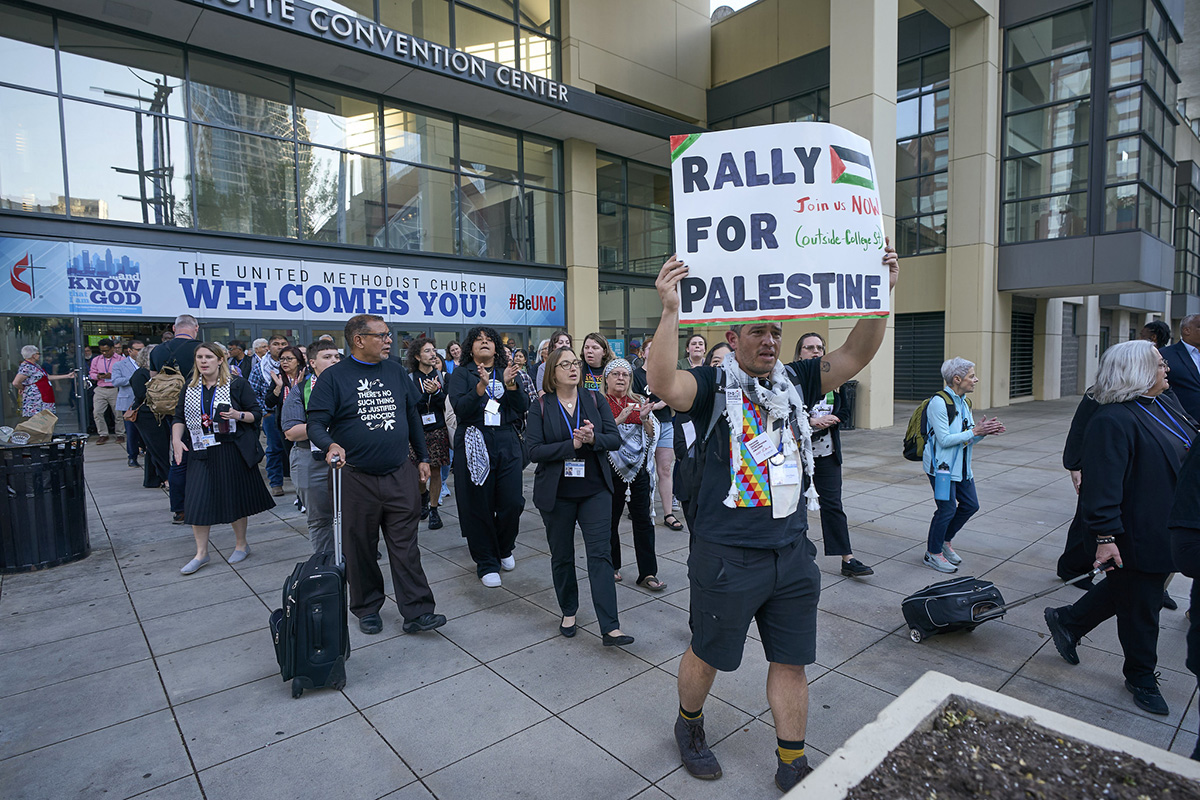Mississippi Conference Bishop Sharma Lewis dropped to one knee and implored delegates to put their trust in God despite the human tendency to be “control freaks,” as the General Conference of The United Methodist Church began its fourth workday.
Speaking during morning worship April 26, Lewis urged delegates to try to discern God’s plans before they settle on their own as United Methodism moves into uncharted territory.
“We have the audacity to think that we accomplished great tasks by ourselves. Some of us even think that we will spend the next week or so making decisions for the future of The United Methodist Church and try to factor God out of the equation,” she said.
Lewis hastened to add that she was not suggesting the delegates refrain from using their intellect, but she encouraged them to leave room for the Holy Spirit in their deliberations as the conference continues through May 3.
“I stand here this morning to challenge us that for the next couple of days we must decide as a denomination that we may not trust each other, but we’re going to trust in the Lord,” she said.
The morning service also featured an interpretive dance and songs on the theme of trusting God. Prayers were led by the Rev. Rob Martin, assistant to the bishop of the Nashville Episcopal Area; Tiffany French-Goffe, a laywoman from the New York Conference and president of its board of trustees; and Erica Robinson-Johnson, director of connectional ministries for the New England Conference.
Connectional Table shares hope
Leaders of the Connectional Table gave a report that emphasized the strength of the United Methodist connection even amid the fraying caused by COVID and church exits.
The Connectional Table is a body of United Methodist leaders from around the globe that coordinates the denomination’s mission and ministry. The leadership body played a key role in moving forward the regionalization plan that delegates approved the bulk of on April 25.
The Connectional Table also coordinates the ministry of general agencies and has worked with them as they have dealt with financial strains during the last four years’ tumult.
North Katanga Area Bishop Mande Muyombo, the Connectional Table’s chair, and Judi Kenaston, the body’s chief connectional ministries officer, presented some highlights from the State of the Church report. The report showcased how The United Methodist Church continues to make disciples and offer life-transforming ministry worldwide even amid its challenges.
“The world will always be in need of the saving love of Jesus Christ,” Muyombo said. “And The United Methodist Church has always been an effective witness of Christ’s redeeming love. It is vitally important that we continue to be so now.”
Update on credentialing delegates
During the morning plenary, delegates voted 702 to 20 to authorize the credentialing of delegates who were provisionally elected in 2023.
The delegates’ vote April 26 responds to a ruling issued last fall by the Judicial Council, the denomination’s top court.
In Memorandum 1485, the church court said it would be up to General Conference to determine how to handle vacancies in jurisdictional and central conference delegations that came about during the assembly’s long COVID-caused delay until this year.
Jurisdictions in the U.S. and central conferences in Africa, Europe and the Philippines elect the denomination’s bishops. Jurisdictional and central conference delegates also serve as General Conference reserves.
The General Conference’s plenary action means delegates elected to fill vacancies can be seated when a member of their delegation needs a break. The vote also authorized the credentialing of people elected as reserves to jurisdictional and central conferences.
General Conference delegates also gave the green light for annual conferences that have not yet held elections to fill jurisdictional and central conference vacancies to do so before those gatherings meet later this year and early next year.
One particular concern for this General Conference has been the absence of delegates, particularly from Africa.
The General Conference’s committee on credentials reports that it continues working to seat delegates who are still arriving to participate in the legislative assembly.
“We know of some credential delegates who are traveling to Charlotte, and should arrive today or tomorrow,” Diane Brown, the committee’s chair and a lay delegate from the Michigan Conference, said during the committee’s morning report.
Bishops, delegates join rally for Palestine

While pro-Palestinian rallies are happening across the U.S., United Methodists at General Conference had their chance to gather in a peaceful show of support on the evening of April 25.
Sponsored by United Methodist Kairos Response, the rally brought together more than 100 United Methodist delegates and observers — along with at least six bishops — to hear from a variety of speakers and call attention to Palestine-related legislation before General Conference.
The United Methodist Church has opposed Israel’s occupation of Palestinian lands since 1976. In March, the United Methodist Council of Bishops called for a ceasefire in the region. Warfare began on Oct. 7, 2023, when Hamas made a deadly surprise attack on Israel, triggering Israel’s devastating aerial bombardment and armed invasion of Gaza.
The Rev. Jorge Dominguez of the California-Nevada Conference said it’s important for United Methodists to denounce what is happening in the Middle East.
“Our church has always maintained a supportive presence, both with the Christian and Muslim communities of the people of Palestine. At this time, it is important to show the world that we are aware that there is a genocide in Gaza and that this is against our values as United Methodists.
“To be in this rally is to be in solidarity with the Israelis and Palestinians who are suffering the consequences of this genocidal war that must not continue.”
Used from UM NEWS
